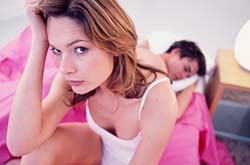A study done by Sleep Heart Health has found more evidence of increased diabetic conditions related to lack of sleep. But it doesn't stop there; it also shows evidence of the same conditions with too much sleep.
These findings come from a study where 722 men and 764 women, aged 53 to 93 years enrolled in the study.
Working with a controlled sleep time of 7 - 8 hours a night and ruling out other potential issues such as sleep apnea, insomnia, obesity, sex, age and race. The study shows a strong link between Type 2 Diabetes, impaired glucose tolerance and amount of sleep.
* In those who slept 5 hours or less a night, Diabetes was 2.5 times more common. In those who slept 6 hours a night, Diabetes was 66% more common. In those who slept 9 or more hours a night, Diabetes was 79% more common.
Over the past 30 years or so the usual sleep per night has declined for adults aged 40 to 79 years of age. Near the end of the 50's, 8 hours a night was the norm with less than 15% reported sleeping less than 7 hours a night. Once we turned the new millennium, the usual sleep times dropped to 7 hours a night and approximately 35% of targeted adults reported sleeping less than 7 hours a night.
Although Insomnia plays some part in this equation, probably brought on by other sleep influences like kids awake at night or tossing and turning on the old mattress. It's amazing to see that the majority of sleep deprivation is voluntary. With 43% of adults polled saying they spend more time than they should to stay up either watching television or using the Internet, the other whopper being 45% reporting staying up later or getting up earlier to get more work done.
When most people see these numbers and results they think that you would have to do this over a lifetime to have these adverse affects. But the study also shows results of impaired glucose tolerance in healthy young adults when sleep was restricted to 4 hours a night for 6 straight nights, 6 nights, that certainly isn't a lifetime! Keep in mind that Diabetes carries a high risk of cardiovascular-related problems which can severely shorten your lifespan.
"This is one additional piece of information bolstering the common recommendation for sleeping 7 to 8 hours a night," says, Boston University's Dr. Daniel Gottlieb, study co-author.
I can deal with the bags under the eyes and the fly catching yawns but life's blowing by as it is and I certainly want to be around when my 6 and 8 year old kids graduate, at least. I realize that you can't always get the right amount of sleep but I know I can always try!

